
1923
The International Criminal Police Commission (ICPC) was established in September 1923 with headquarters in Vienna, Austria. Dr Johannes Schober, President of the Vienna Police, served as President of INTERPOL from its creation until 1932.
1927
Participants at the 4th General Assembly session held in Amsterdam in 1927 adopted a Resolution that each member country should establish a central point of contact within its police structure; this was the forerunner of today's National Central Bureau (NCB). The General Assembly remains the Organization's supreme governing body, meeting once a year and taking all the major decisions affecting general policy, the resources needed for international cooperation, working methods, finances and programmes of activities.

1930
By 1930, specialized departments had been established to deal with criminal records, currency counterfeiting and passport forgery. Prior to the 1980s, when computerization of INTERPOL's records began, data was compiled and analysed manually. At this time, a comprehensive general records system comprised name index cards (filed both alphabetically and phonetically), legal documents (such as identity details and vehicle registrations numbers), and offences (classified by type and location). Complementing these were specialized records including fingerprints and photos.

1932
New statutes were put in place creating the post of Secretary General. The first was Austrian Police Commissioner Oskar Dressler who served until 1946. He was followed by Louis Ducloux (France) 1946-1951; Marcel Sicot (France) 1951-1963; Jean Népote (France) 1963-1978; André Bossard (France) 1978-1985; Raymond Kendall (United Kingdom) 1985-2000; Ronald K. Noble (United States) 2000-2014; Jürgen Stock (Germany) 2014-2024; and Valdecy Urquiza (Brazil) 2024-date.

1935
The Organization's international radio network was launched in 1935, providing an independent telecommunications system solely for the use of the criminal police authorities at national level. By 1966, 34 countries had stations on the INTERPOL radio network which carried more than 90,000 messages per year. Today, millions of messages are transmitted annually via a secure, web-based, police communications system, accessible to 196 countries.

1938
In 1938, the Nazis assumed control of the International Criminal Police Commission (ICPC) after deposing President Michael Skubl. In 1941, the Commission’s headquarters were relocated to Berlin, at 16 Kleinen Wannsee, and the Organization remained under Nazi control until the end of World War II.

1946
Belgium led the rebuilding of the Organization after the end of World War II. A democratic process to elect the President and Executive Committee was instituted and the Headquarters moved to Paris, France. Pictured here, Florent Louwage, ICPC President, addresses the 15th session of the General Assembly in Brussels, June 1946. In the same year, "INTERPOL" was chosen as the Organization's telegraphic address.


1947
The first Red Notice was issued in 1947 for a Russian man wanted for murdering a policeman. Effectively an international alert for wanted persons, the Red Notice includes identifying information and a summary of the charges against the person. The system of colour-coded international notices was expanded over the years to include Yellow (missing persons), Blue (additional information), Black (unidentified bodies), Green (warnings and intelligence), Orange (imminent threats), Purple (modus operandi) and the INTERPOL–United Nations Security Council Special Notice for groups and individuals under UN sanctions.
1950
The emblem and flag have been in use since 1950. The emblem comprises the globe, to indicate that our activities are worldwide, olive branches symbolizing peace, scales symbolizing justice and a vertical sword, symbolizing police action. The flag, used for protocol and events, has the emblem in the centre, and four lightning flashes which symbolize telecommunications and speed in police action.

1956
The General Assembly, meeting in Vienna, adopted a modernized Constitution that sets out the fundamental rules and principles by which the Organization operates. We changed our name to the International Criminal Police Organization-INTERPOL, and became autonomous by collecting dues from member countries and relying on investments as the main means of support.

1959
Mr G. Yates, Director, Division of Narcotic Drugs, United Nations, speaking at the 1st international cycle of study on the illicit traffic of narcotics in March 1959. This meeting highlighted the early cooperation between INTERPOL and other international organizations, as well as the need for experts specialized in investigating a wide range of different crime areas.

1962
INTERPOL's membership has grown steadily since its creation. From the original 20 founding members in 1923, there were 50 member countries by 1955 as the Organization rebuilt itself after the Second World War. This map shows the member countries as of September 1962. Changing geographical boundaries of nations, such as the break-up of the Soviet Union and Yugoslavia, led to new nations joining. By 1967, there were 100 countries, reaching 150 by 1989 and today's total, 196, in 2023.

1969
Countries in the same region are often affected by similar crime threats and issues. Recognizing the importance of sharing information and expertise on a regional level, INTERPOL organized its first regional conference for member countries in Liberia in 1963. Pictured here is the 3rd African Regional Conference held in Addis Ababa, Ethiopia, in 1969.

1972
INTERPOL's status as an international organization was strengthened in the 1970s by United Nations recognition and a Headquarters Agreement with France in 1972 recognizing INTERPOL as an international organization. Based in France since 1946, the INTERPOL General Secretariat was located first in Paris, then in Saint Cloud (pictured here) from 1966 to 1989, after which it moved to Lyon.

1982
The processing of personal data – such as names and fingerprints – forms a key activity at INTERPOL. It is carried out within a clearly defined legal framework in order to protect both the fundamental rights of individuals and cooperation among police internationally. In 1982, the INTERPOL General Assembly adopted the Rules on International Police Cooperation and on the Control of INTERPOL's Archives. This marked the start of the Commission for the Control of INTERPOL's Files (CCF), an independent monitoring body. To this day, the Organization continues to refine its rules and regulations.

1986
On 16 May 1986, the INTERPOL General Secretariat building in Saint Cloud was attacked by an extremist group known as Direct Action. A policeman who had been on duty was injured and the building suffered extensive damage. A local resident told French radio, "First they machine-gunned the building, then the bomb exploded. All the window panes in the street shattered." In 1998, four leaders of the Direct Action group were tried in connection with this and other bombings and shootings in France, and sentenced to 10 years each in prison.

1989
The INTERPOL General Secretariat moved to purpose-built premises in Lyon in 1989, with an official inauguration by France's President, François Mitterrand, on 27 November. This building is still the home of the Secretariat, now strengthened by regional bureaus in Africa, the Americas and Asia. Also in 1989, INTERPOL's membership reached the milestone of 150 countries.

1993
Criminal analysis techniques are increasingly used by police forces, international organizations and the private sector. By identifying patterns in crimes, it is possible to provide warnings of threats and to better support operational activities. In 1993, an analytical criminal intelligence unit was set up at the General Secretariat. Specialized computer programs enable analysts to study the links between suspects, crimes and locations.

1999
As the membership of the Organization grew, so too did its diversity. A General Assembly resolution of 1967 urged member countries to propose staff members to work at the General Secretariat; today, seconded officers represent around one-third of staff. In its early days, the Organization's working languages were French and English, with Spanish being used from 1955. Arabic was formally adopted as the fourth official language in 1999. Today, all official documentation is translated into all four languages and interpretation is provided at major conferences and meetings.
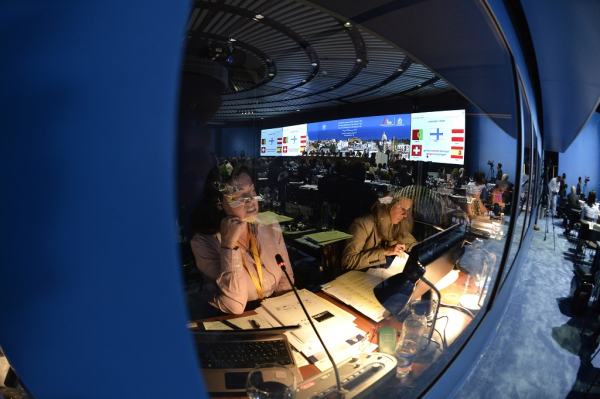
2000
Fingerprint evidence has always played a crucial role in criminal investigations, since the early days of international policing when paper prints were shared and manually compared. In 2000, INTERPOL introduced an automatic fingerprint identification system (AFIS) in order to dramatically reduce the time needed to carry out fingerprint checks.

2001
The terrorist attacks on the United States of 11 September 2001 marked a turning point for INTERPOL and how it functioned. The Organization became operational 24 hours a day, 7 days a week. Since then, INTERPOL has developed a more reactive, relevant and operational function, to better assist police in its member countries in times of crisis.

2002
Responding to the need for all member countries to have a secure platform on which they could share and access information, INTERPOL launched a secure global police communications system, known as I-24/7, in 2002. It forms the backbone of all secure INTERPOL communications and gives National Central Bureaus access to INTERPOL's wide range of databases and services. Canada (pictured here) was the first member country to connect in 2003, and by 2007 all countries had overcome technical challenges and were connected; some by satellite.
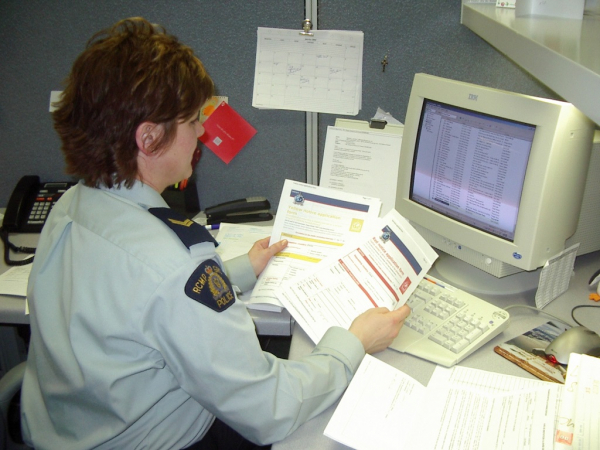
2002
Recognizing that criminals often travel using fraudulent documents, INTERPOL launched the Stolen and Lost Travel Documents (SLTD) database in 2002. The aim: to help member countries make their borders more secure and to protect their citizens from terrorists and other dangerous criminals entering their country using a fake identity.

2002
In recent decades, DNA profiling has been used increasingly in criminal investigations. Discovered in 1953, DNA was first used by police in 1987, and the first national DNA database was set up in 1995. INTERPOL's DNA database was created in 2002. DNA sampling is useful not only for solving crimes, but also identifying victims of disasters and locating missing persons.

2003
Following the terrorist attacks of 11 September 2001, INTERPOL set up a Command and Coordination Centre (CCC) to provide a point of contact for any member country seeking urgent police information or facing a crisis situation. The CCC is manned 24 hours a day, 365 days a year by staff members who are fluent in several different languages. In a move to strengthen its presence across all time zones, the CCC opened a second operations room at its Regional Bureau in Buenos Aires in 2011; a third site opened in Singapore in 2015.

2004
Partnerships with other international organizations are essential for INTERPOL to fulfil its mission. Collaboration with the United Nations has been continually strengthened over the decades, notably with the opening of an INTERPOL office at the UN in New York in 2004. Other major partners include Europol, the European Union and the African Union, where offices were opened in 2007, 2009 and 2016 respectively.
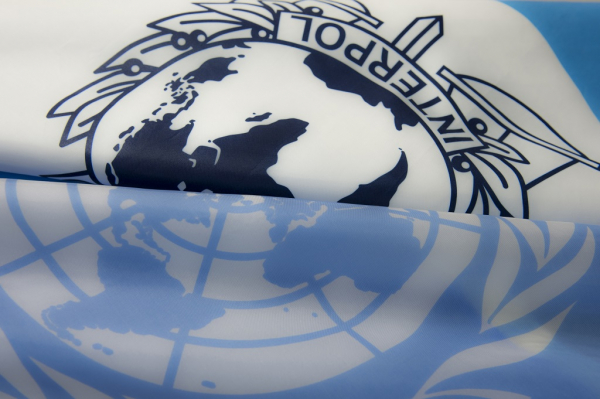
2005
6 December 2005 saw the publication of the first INTERPOL–United Nations Security Council Special Notice. The principal function of the notice is to alert national law enforcement authorities of UNSC sanctions against designated individuals and entities: notably assets freeze, travel ban and arms embargo. The Special Notice was created as a way to combine the UN sanctions regime with INTERPOL’s well-established notice system to form an effective law enforcement tool.

2005
I-24/7 is the network that enables authorized users to access in real-time INTERPOL's range of criminal databases. In 2005, new technology called MIND/FIND was introduced to extend I-24/7 beyond INTERPOL National Central Bureaus and out to frontline officers such as immigration and customs officials. Officers in strategic locations can now directly access three key INTERPOL databases: those on nominal data, stolen and lost travel documents, and stolen motor vehicles.


2007
On 8 October 2007, INTERPOL launched its first-ever public appeal for help, after all police channels had failed to identify a man featured in child sex abuse images on the Internet. The photographs had been digitally "swirled" to obscure the man’s face, but investigators at Germany’s Bundeskriminalamt were able to reverse the process. Within hours of the man's photo being published on INTERPOL's website, members of the public on three continents named him as a Canadian national working in Korea. With police closing in, the suspect fled to Thailand, where he was arrested 11 days later.
2007
The importance of police training was recognized in 2007 when it was established as a core function of the Organization. Today, training courses support police skills and best practices in how to use INTERPOL tools and services, and also cover a wide range of specialized crime and investigation areas. An online portal offers e-learning modules, and we have made a major shift today to digital training, in a trend accelerated by the COVID-19 pandemic.

2008
Some 1,000 people perished during Typhoon Frank in the Philippines in June 2008. An INTERPOL Incident Response Team, comprising DNA and Disaster Victim Identification experts, was deployed to Cebu City to support the local authorities in identifying the victims. More than 3,000 DNA samples were collected from victims and from their relatives. Of the 609 bodies recovered, 483 were identified using DNA analysis and other traditional methods such as examination of fingerprints and dental records.
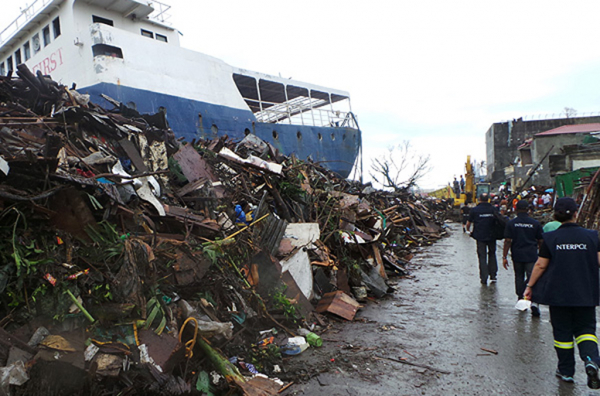
2009
The General Secretariat has seven regional offices, in recognition of the value of bringing together police within a region to share experiences and tackle common crime issues. The Regional Bureau in Yaoundé, Cameroon, was opened in 2009 (pictured here), complementing the other offices in Bangkok, Thailand (1992), Buenos Aires, Argentina (1993), Abidjan, Côte d’Ivoire (1994), Harare, Zimbabwe (1997), Nairobi, Kenya (1999) and San Salvador, El Salvador (2003).

2010
INTERPOL Major Event Support Teams (IMESTs) assist member countries in the preparation, coordination and implementation of security arrangements for major events. The first IMEST was deployed to Salt Lake City, USA, for the Winter Olympic Games in 2002. In 2010, an IMEST assisted authorities in South Africa with security for the FIFA World Cup, posting staff at airports and border crossings, hotels and match venues to help conduct instant checks against INTERPOL’s global databases. During the tournament, South Africa hosted more than one million visitors without any major incident.

2010
Helping police to catch fugitives who flee abroad to escape prosecution has always been at the core of INTERPOL's mission. Operation Infra works to locate and arrest serious long-term international fugitives, who have committed crimes such as murder, child sexual abuse, drug trafficking and money laundering. Officers from several countries work together in a special operations room, allowing them to exploit the contacts and knowledge that they each have of their own criminal justice system.

2012
The General Assembly in Rome, 2012, opened with a ministerial meeting involving justice, security and home affairs ministers from nearly 100 countries. Discussions centred on the theme of ‘Challenges for police facing contemporary criminal violence’ and delegates adopted a Declaration calling for a common response to the new challenges facing police worldwide. Three years earlier, a joint INTERPOL-United Nations ministerial meeting in Singapore in 2009 saw more than 60 ministers endorse a Declaration on enhancing the role of police in the world’s peacekeeping operations as a vital element in ensuring global security.
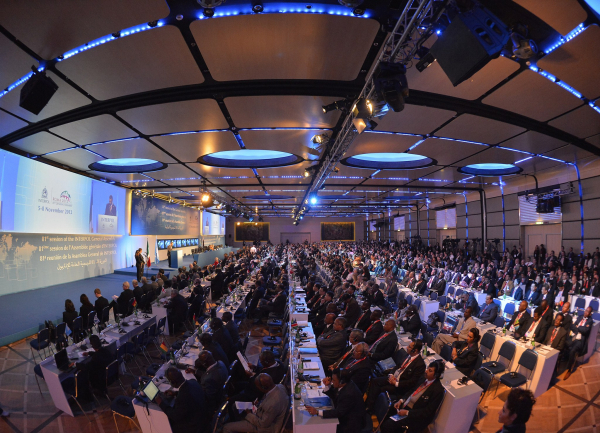
2012
Mireille Ballestrazzi, Deputy Central Director of the French Judicial Police, was the first woman to be appointed to the post of President of INTERPOL, reflecting the active role of both men and women in the international law enforcement community. The President of the Organization heads its Executive Committee and is elected by the General Assembly for a period of four years.
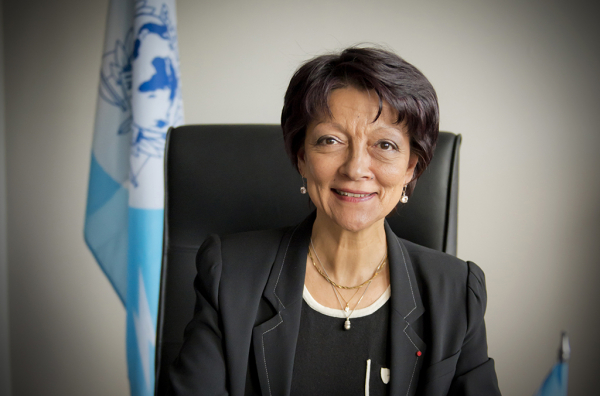
2013
Nearly 30 tonnes of cocaine, heroin and marijuana with an estimated value of USD 822 million were seized in Operation Lionfish. This INTERPOL-led operation targeted the maritime trafficking of drugs and illicit firearms by organized crime groups across Central America and the Caribbean. Operation Lionfish was run as part of INTERPOL's Integrated Border Management Task Force which centralizes the Organization's border security efforts, encompassing systems, databases, operations and training.
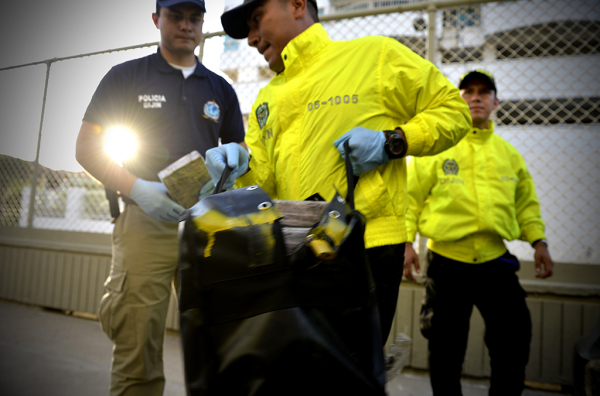
2015
The INTERPOL Global Complex for Innovation (IGCI) is a cutting-edge research and development facility for the identification of crimes and criminals, innovative training, operational support and partnerships. Based in Singapore, the IGCI complements the General Secretariat in Lyon, France, and enhances the Organization's presence in Asia. It was officially inaugurated in April 2015.

2016
The facial recognition system went live, complementing the Organization’s existing expertise and tools in fingerprints and DNA. Coupled with an automated biometric software application, this system is capable of identifying or verifying a person by comparing and analysing patterns, shapes and proportions of their facial features and contours.
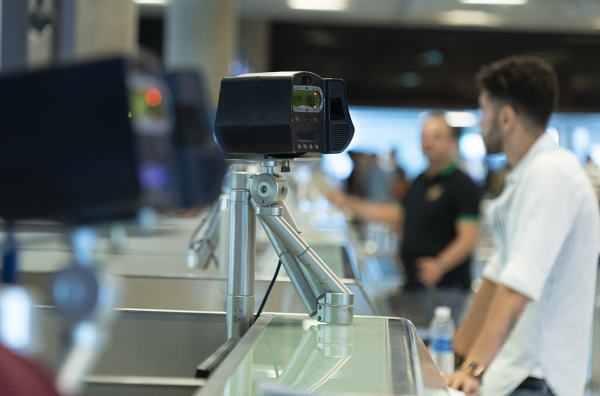
2017
In 2017, INTERPOL’s International Child Sexual Exploitation (ICSE) database reached the milestone figure of 10,000 identifications. Since it came into use in 2001, the database has become a powerful intelligence and investigative tool. Using image and video comparison software, specialized investigators are instantly able to make connections between victims, abusers and places.

2018
We adopted a set of seven Global Policing Goals to reflect our priorities against criminal and terrorist threats, in alignment with the United Nations 2030 Agenda for Sustainable Development. They focus the collective efforts of the international law enforcement community to create a safer and more sustainable world for future generations.

2019
The I-CORE programme was launched to reinforce INTERPOL’s function as a global police information hub. Criminal data is at the heart of our member countries’ crime-fighting activities and INTERPOL offers a platform for police around the world to share information easily and in a secure way. Through a number of innovative projects, I-CORE will harness new technology to better support frontline policing and make data available to police: smarter, faster, everywhere.

2020
INTERPOL provided 24/7 support to police worldwide during the COVID-19 coronavirus pandemic. Law enforcement services played a crucial role in contributing to the effort to control the disease, promoting safer communities, and fighting criminals who take advantage of the outbreak. In response, INTERPOL issued guidelines to help national police identify and address crimes impacted by the pandemic, including domestic violence, child abuse, cybercrime and vaccine fraud.

2021
The I-Familia database was launched, taking the number of INTERPOL databases to 19. The result of cutting-edge scientific research, I-Familia seeks to identify missing persons or unidentified human remains when direct comparison is not possible, by using DNA samples from family members instead. This is a complex process – even more so when carried out internationally – which is where INTERPOL can play a unique role through its global network.
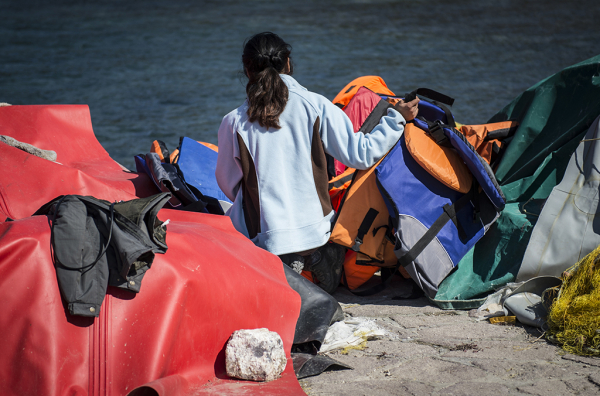
2021
INTERPOL launched its first mobile application, ID-Art, which gives access to INTERPOL’s Stolen Works of Art database. The app helps to identify stolen cultural property, reduce illicit trafficking, and increase the chances of recovering stolen items. ID-Art can be used by police officers, custom officials, the general public, private collectors, art dealers, journalists, students or art enthusiasts. In its first year, the app was downloaded 25,000 times in 170 countries.

2021
Over the century, INTERPOL has had 29 presidents from 18 countries. The role of the President, which is part-time and unpaid, is to chair the General Assembly and three meetings of the Executive Committee each year. INTERPOL’s current President is Major General Ahmed Naser Al-Raisi, of the United Arab Emirates, elected in November 2021.

2022
Transnational financial crime has grown exponentially in recent years, undermining global financial systems, impeding economic growth and causing huge losses to businesses and individuals worldwide. Given the urgent need for a coordinated international response, we launched the Financial Crime and Anti-Corruption Centre (IFCACC). This major new crime programme will expand and streamline our existing initiatives in tackling financial crimes, illicit money flows and asset recovery.

2022
On 16 December, the United Nations General Assembly adopted a resolution to create an International Day of Police Cooperation, in recognition of the vital work of the law enforcement community around the globe. The day will be observed every 7 September, the date when INTERPOL’s predecessor, the International Criminal Police Commission (ICPC), was created in 1923.

A number of historical books and other scholarly publications which include in-depth details about the origins of the International Criminal Police Commission, the Nazi takeover and the rebuilding of INTERPOL as the International Criminal Police Organization are available.
The following is a non-exhaustive list of publications and is not meant as an endorsement or that the content necessarily represents the views of the Organization:
- Policing World Society by Mathieu Deflem (2002)
- Verfolgung durch Verwaltung: Internationales Verbrechen und internationale Polizeikooperation Jens Jäger (2006)
- Interpol, Fenton S. Bresler (1992)
- Interpol: Issues in World Crime and International Criminal Justice Michael Fooner (1989)



